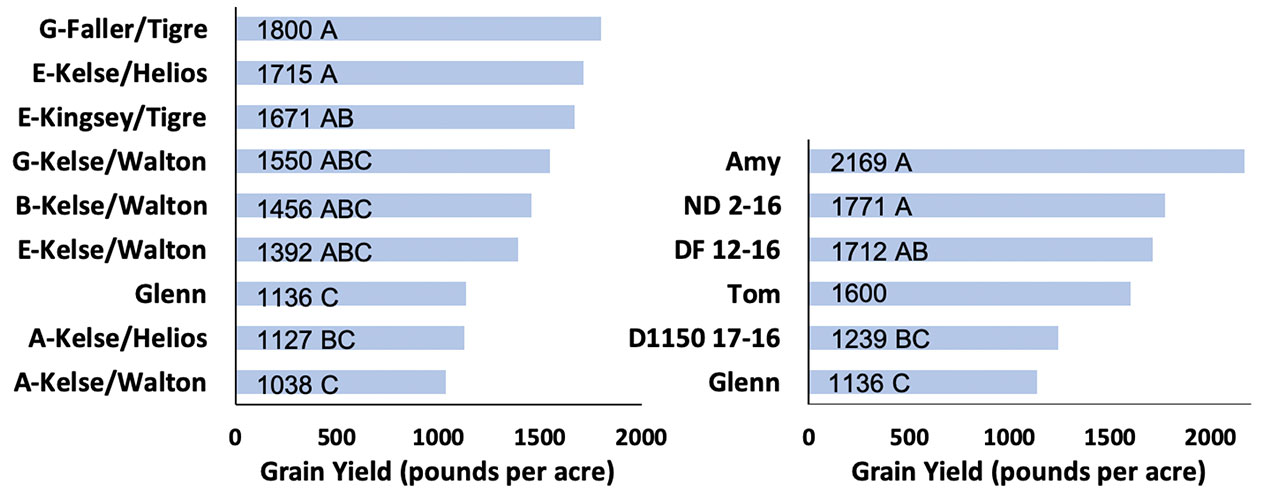2020 Spring Wheat Variety Trials
2020 Spring Wheat Variety Trials (PDF)
Ellen Mallory and Tom Molloy, University of Maine Cooperative Extension
University of Maine Cooperative Extension collaborated with Cornell University and the Maine Grain Alliance (MGA) to conduct two separate spring wheat variety trials in 2020.
Farmer-Selected Spring Wheat Project
This trial compared spring wheat lines that were developed from crosses of heritage and modern varieties done by University of Vermont. In 2014, organic farmers in Maine, New York, and Vermont planted the “populations” that resulted from those crosses and selected the best individual plants in terms of early-season vigor and overall performance on their farms. The seed from those selections was increased in winter nurseries, and planted and selected again by the farmers the next season. In this way, the farmers developed individual lines with improved weed competitive ability that are adapted to their farms’ growing conditions. Eight of the lines were identified as top performers in subsequent regional evaluations, including two from a central Maine farm (marked “G-“ in Figure 1). In 2020, these top-performing lines were grown in coordinated trials in Illinois, Maine, New York, Vermont, and Wisconsin. The lines will be evaluated for weed competitiveness, FHB tolerance, grain yield, grain quality, and baking characteristics, with the goal of releasing one or more regionally adapted varieties for organic farmers. Only Maine results are presented here.
Maine Grain Alliance Seed Restoration Project
MGA collects and evaluates rare and heritage small grain varieties, and increases the seed of varieties well-suited to Maine to make it available to farmers. The hard red spring wheat varieties in this trial were given to MGA by plant breeder Dr. Anders Borgen of Agrologica in Denmark. Amy is a Swedish variety released in 1971 with excellent baking quality. The others were bred by Dr. Borgen. DF 12-16 is a line from a cross between Swedish variety Dacke and Swiss variety Fiorina and has yellowish flour, likely from elevated content of lutein (like durum and einkorn). ND 2-16 is a line from a cross between Dacke and Swiss variety Nadro. D1150 17-16, a purple wheat, is a line from a cross between Dacke and a genebank accession. For more information about MGA’s Seed Restoration Project, see https://kneadingconference.com/heritage-seed-restoration/
METHODS
The trials were conducted at Buck Farms in Mapleton, Maine on a Caribou gravely loam soil. The previous crop was sunflower. Fertility consisted of a pre-plant application of 19-0-19 at 340 lbs/acre. Wheat was planted on May 20 at a target density of 1.7 million live seeds/acre. This density translated to 105-125 lbs/acre of seed depending on the seed weight of the different varieties. The plots were treated with 2-4D (1 pt/acre) on June 12 to control weeds and Prosaro (6.5 oz/acre) on July 16 to control Fusarium head blight. Grain was harvested on August 20 with a plot combine.
RESULTS
The 2020 season was significantly warmer and dryer than usual (Table 1). Drought conditions started in June, continued through the remainder of the season, and severely impacted yields. For instance, Glenn, a popular spring wheat variety in our region, yielded less than half of what it yielded in prior trials in Orono and Presque Isle. Under this year’s conditions, a number of the farmer-selected wheat lines and the MGA project varieties performed significantly better than Glenn (Figure 1).
For additional variety trial reports and other grain growing information, visit the University of Maine Cooperative Extension Grains, Pulses, and Oilseeds website.
| † The weather station in Caribou is approximately 20 miles from the Mapleton site. 30-year norms are from 1981 to 2010. | |||||
| Total Rainfall (inches) | Temperature (F) | ||||
|---|---|---|---|---|---|
| Month | Buck Farm | Caribou | Caribou 30-yr avg. |
Caribou | Caribou 30-yr avg. |
| April | – | 2.8 | 2.7 | 37 | 39 |
| May | 2.8 | 2.4 | 3.3 | 51 | 51 |
| June | 0.5 | 0.9 | 3.5 | 64 | 61 |
| July | 2.0 | 3.0 | 4.1 | 70 | 66 |
| August | 1.8 | 2.2 | 3.8 | 66 | 64 |
| Total | 11.3 | 16.7 | |||

Updated October 2020.
This project was funded by Hatch Award number ME021815.
Information in this publication is provided purely for educational purposes. No responsibility is assumed for any problems associated with the use of products or services mentioned. No endorsement of products or companies is intended, nor is criticism of unnamed products or companies implied.
Call 800.287.0274 or TDD 800.287.8957 (in Maine), or 207.581.3188, for information on publications and program offerings from University of Maine Cooperative Extension, or visit extension.umaine.edu.
The University of Maine does not discriminate on the grounds of race, color, religion, sex, sexual orientation, including transgender status and gender expression, national origin, citizenship status, age, disability, genetic information or veteran status in employment, education, and all other programs and activities. The following person has been designated to handle inquiries regarding non-discrimination policies: Director, Office of Equal Opportunity, 101 North Stevens Hall, 207.581.1226
